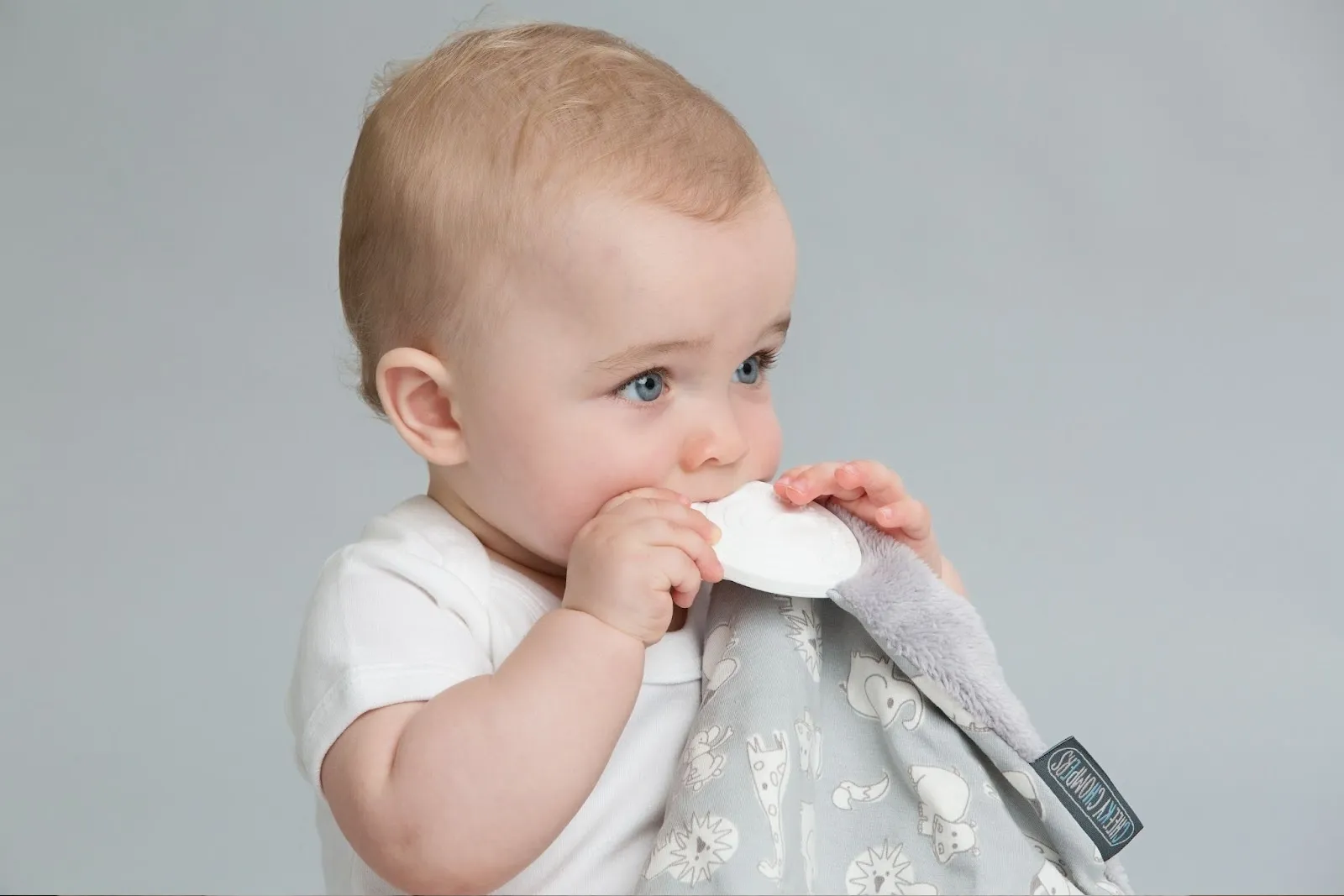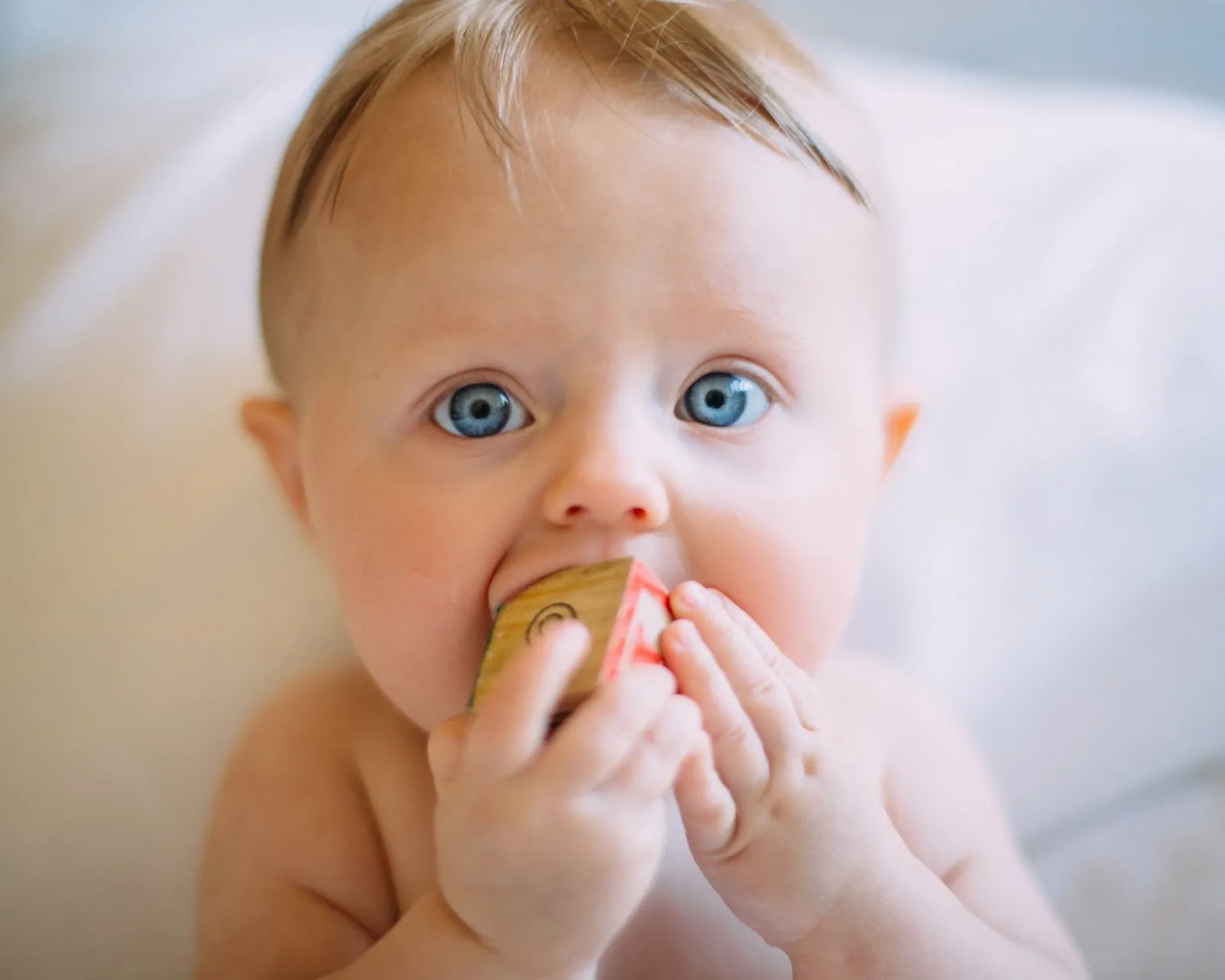Teething is an important developmental milestone during a baby’s first year. It’s an exciting time, especially when you imagine them smiling with two little teeth peeking through. At the same time, it can also be stressful for the both of you.
Here’s what you need to know about teething, from what to expect and how to help your little one through the process.
Key Takeaways:
- A baby’s teeth start coming in at around six months.
- Signs and symptoms of teething include excessive drooling, biting and gnawing, and irritability.
- Teething can be uncomfortable, but there are several ways to soothe and calm your infant down.
Baby Teething by Age: When Does a Baby’s Teeth Come In?
Technically, a baby starts “teething” before they’re even born. Their gums, tooth buds, enamel, and dentin begin developing during the eight week of pregnancy and will continue to harden and grow.
By the time you get to hold your bundle of joy, his mouth has 20 little tooth buds already in place — 10 on the top and 10 on the bottom.
Your baby will start teething a few months later, during which their baby teeth will erupt through the gums. They typically get their first tooth at the six-month mark.
Still, each baby follows their own teething schedule. With that said, here’s a general timeline of the baby teething process:
Teething from 0 to 3 Months
Some children are born with their first teeth already erupted (out of the gums), but this is rare. You might be able to feel the hard ridges of your baby’s teeth under the gums, though.
Teething at 4 to 7 Months
Most babies start teething around 6 months, give or take, along with the signs and symptoms of teething.
The first teeth usually appear at the bottom front of the mouth (aka the lower central incisors), followed by the top front teeth, which are known as the upper central incisors. By the time your baby is 8 or 9 months old, he’ll probably have two to four teeth.
Teething at 8 to 12 Months
By your child’s first birthday, he may have up to four teeth. The two top and bottom teeth in front (central and lateral incisors) are usually joined by another two — first molars — on the top and bottom. The last four teeth usually grow in around 15 to 18 months.
Teething at 12 to 18 Months
Molars (back teeth used for chewing) are next in line, followed by your child’s lateral incisors (the teeth beside the middle incisors). As these new teeth push through the gums, they may cause pain, irritability, and other symptoms.
Your child will probably have four molars (two on top, two on bottom) by the time she turns 2 years old.
Teething at 18 to 24 Months and Beyond
As your child gets older, keep an eye out for more teeth. Your child should get his first molars when he’s around a year old, followed by his second molars around two months of age. His first permanent or adult teeth will start coming in around age 6 and continue until he’s about 12 years old
Signs of Teething in Infants
The American Dental Association recommends that parents begin monitoring their children for tooth-eruption signs as early as three months of age.
Your baby’s first tooth may be coming in if you notice the following:
- Fussiness and irritability
- Drooling more than usual
- Biting or chewing on fingers, toys, or other objects
- Trouble sleeping (including waking up at night)
- Ear pulling or cheek rubbing
- Swollen gums with a visible white or bluish bump under the gum line
- Have a slightly elevated body temperature or fever
Some children may not show any symptoms at all, while others have a harder time getting their first tooth.
Either way, pay close attention to any change in behavior. The above may also be symptoms of an ear infection and other conditions.
How to Soothe a Teething Baby
Most infants experience some discomfort as their first tooth starts to break through the gums. But for a small number of infants, it can be especially painful and disruptive.
Specifically, there are two types of teething pain: The first type is pressure on the gums as a tooth pushes through. This usually causes mild discomfort. The second type is caused by inflammation, which happens as the tooth breaks through the gum line, and this pain can be quite intense.
Here are some parenting tips on making them feel better during the day and at night.
How to Soothe a Teething Baby During the Day:
Discomfort can strike at any time, so always have ways to soothe your baby on hand whether you’re home and out running errands. Here are some suggestions:
- Keep him calm and relaxed.
A quiet environment is best for fussy infants. Take them out of loud environments or away from busy play areas so they can settle down.
- Rub their gums.
Gently massage their gums with a clean finger, wet gauze, or small cool spoon.
- Give your baby something to chew on.
Cold numbs the gums and can help calm your child’s discomfort. Try a wet washcloth that has been chilled in the refrigerator (not wet then frozen, as this could damage their tender gums and baby teeth).
Similarly, cold food and drinks can help, so offer them often throughout the day.
For instance, try giving your little one some chilled formula or breast milk. You can also give them chilled yogurt drops, pureed fruit, or chopped fruit to chew on.
- Give them a teething ring.
Toys like a teething ring are designed to be frozen or chilled in the refrigerator for safe pain relief. They also provide something for your baby to gnaw on, which will help relieve the pressure in their gums as their baby teeth erupt.
Look for toys that have bumps or nodules that massage your baby’s gums as he chews. Double-check the teething toy for safety.
The FDA warns consumers against letting a baby gnaw on anything that has PVC, BPA, and toxic paints.
How to Soothe a Teething Baby at Night:
If your baby is having trouble sleeping at night, here are some tips you can try:
- Give your baby a cold washcloth to chew on.
Do this as you put her down for the night. This will keep her occupied while numbing the pain.
- Put a cold compress on your baby’s face where the teeth are coming in.
You can make a compress by wetting a clean washcloth with cool water and putting it in the freezer for about 15 minutes before pressing it to your baby’s neck or cheeks.
- Massage your baby’s gums with a clean finger.
Gently rubbing their delicate gums is a great way to make a baby comfortable no matter what time it is.
Keep it brief during the night, though. Too much stimulation might over-arouse your baby and make it more difficult for him or her to sleep.
- Naturally soothe sore gums with chamomile tea bags.
Wet two chamomile tea bags and then chill them in the freezer until they’re cold but not frozen solid. Then let your child gnaw on them (supervise closely).
Aside from numbing the sore area, chamomile tea also has a calming effect that can help your baby fall or stay asleep.
Are Tylenol and Motrin Better for Teething? – Medicine for Teething Babies
Acetaminophen (Tylenol®) or ibuprofen (Advil® or Motrin®) can also help relieve symptoms. These medicines are safe for most babies six months and older when used correctly.
Before administering any medication, even OTC ones, always check with your baby’s doctor.
More Tips on Dealing with Teething Symptoms

Many parents find it overwhelming to see their babies crying and fussing regardless of the reason. Here are more things to remember:
- Always keep your baby’s mouth, face, hands, and teething toys clean.
- To prevent hurting your baby’s gums, thaw frozen toys a bit before allowing them to gnaw on it.
- Babies drool a lot as they get their first teeth, so keep them hydrated.
- Don’t rub whiskey on their gums and inner cheeks. Any amount of liquor is dangerous for babies.
- Avoid rubbing numbing agents inside your baby’s mouth. Consult your doctor before giving anything a baby swallows, including homeopathic teething gels and baby Orajel.
- Don’t give them items like amber teething necklaces, as these can pose a choking risk. Use teething rings instead.
- Be gentle with yourself and your baby during this time.
Finally, it’s never too early to take your baby to a pediatric dentist. For one, they can advise you about safe ways to ease your baby’s teething pain and what to do as each tooth erupts.
They can also teach you how to take care of babies’ teeth, including when to get an infant toothbrush, the right time to use a pea-sized amount of fluoride toothpaste, and preventing dental problems like tooth decay.
If you’re interested in using homeopathic teething products for your child’s teeth, it’s a good idea to check with them as well.
FAQs
Do babies eat less when they get their baby teeth?
Yes, it’s very common for babies to eat less simply because their gums are swollen and sensitive.
Do babies poop more when teething?
No, babies don’t poop more when teething. This is a common myth.
According to pediatric dentistry experts, what does happen is that when a baby is teething, it coincides with major developments. For instance, they may start eating solid food, which can, in turn, lead to changes in their bathroom habits.
Do babies sleep a lot when teething?
Some babies do sleep more when teething, but it’s usually because the discomfort makes them tired out from fussing or general crankiness.
It could also be that they don’t get a lot of sleep at night due to the fussiness associated with teething—in this case, babies make up for it with daytime napping.
Do babies throw up when teething?
No, teething does not cause babies to throw up. There is no evidence to support the idea that teething can make children vomit.
However, it’s worth remembering that teething can cause symptoms like drooling, and once that drool causes irritation in the mouth, it could trigger the gag reflex.
If your baby is throwing up more than usual, talk to their pediatrician.
Can Tylenol relieve a baby’s gums during teething?
Yes, Tylenol can help with teething.
Still, the American Academy of Pediatrics recommends that you try alternatives to painkillers before giving your baby any medicine.
If you’re going to use Tylenol for teething pain, consult with your child’s pediatrician about how much to give and how often.
Is drooling a sign of teething?
Yes, drooling is part of teething symptoms, but it’s also normal infant behavior. Look for other signs as well, including fussiness, gum-rubbing, and biting on toys or fingers.
If you notice these behaviors in addition to drooling, your baby is most likely teething.
Related Read: When Do Babies Stop Drooling | Drooling Questions Answered
How to treat a runny nose during teething?
Runny noses are perfectly normal as your baby’s teeth come in. The eruption of a baby’s teeth irritates the gums and the body’s immune system produces extra mucus in response.
Use a clean tissue or soft cloth to wipe their nose several times a day. You can also use saline drops and a bulb syringe to relieve any difficulty breathing.
Wrapping It Up
Teething is a natural process that all babies go through. Knowing what to expect can help make the experience less stressful not just for your baby, but for you as well.











